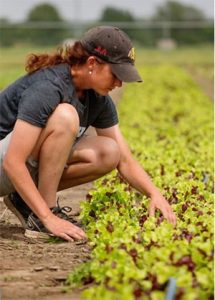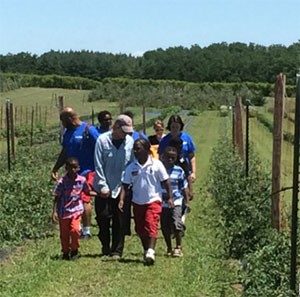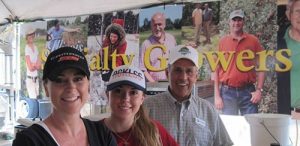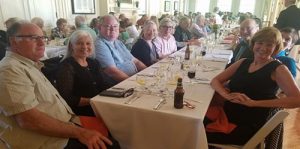This week’s blog entry is from a guest writer. If you are interested in your article or blog entry being featured on the TLC blog, contact [email protected].
By: Ann Swanson, Hendrick House Food Service

When we decided to embark on this farm adventure five years ago I did not take into consideration the educational components that would be involved. After completing the New Illinois Fruit and Vegetable Farmers course through University of Illinois Department of Crop Sciences in cooperation with the Extension’s Local Food Systems and Small Farms Team and acquiring a lease courtesy of the Department of Crop Sciences, I was more concerned with the transition of my career and becoming a great farmer. One of the biggest lessons I have learned along the way is that you can plant the ground and grow the crops but if you don’t have a market then the first part doesn’t matter. The goal of our farm is to assist in paving the way for a food revolution, changing the way people eat and think about food. Education is such a major component when focusing on local and fresh food.

There is a large disconnect between utilizing fresh, local food in kitchens and institutionalized cooking. Institutionalized food is the forgotten part of the food revolution, where pre-packaged, processed foods are being served instead of fresh homemade food. Processed food is cheap and nutritional guidelines are easier to track and maintain. Also, food service employees have little to no training so it is easier to serve pre-made food that takes less preparatory skill.Children and adolescences have developed palettes for pre-processed food because that is what they are being served.
Local farmers are affected because the general population does not connect with the importance of reducing economic viability for these farmers. Small farms are faced with volume challenges when supplying large dining facilities.
Identifying and helping to solve these problems are important to Hendrick House because we are in the unique position of bringing change necessary to revamping the institutionalized food system, since we are producing fresh healthy food on our farm. As more chefs in the company purchase Hendrick House farm produce, our farm viability will also increase. It starts with education from all sides of the food chain. If we can change the way a generation looks at food, then it will have a lifetime impact for farmers, individuals, and the community.
Luckily, there are so many great organizations that are working towards the very goals mentioned above. The Land Connection and Illinois SARE have been instrumental in helping to connect me with people and programs that have put me on the right path with the necessary tools to get the word out regarding local food. Cassie Carroll formerly with the Land Connection, informed me about a SARE grant that I might be eligible for to help assist me with costs of implementing these ideas. I spent the months of October and November of 2016 forming a plan and applying for the SARE Farmer/Rancher grant. For any of you who have written grants you know how tedious it is. There were a lot of revisions up until moments before submission. Cassie and Bobbie, board member and part owner of Hendrick House, were amazing and helped me all the way through until the deadline submission date of December 7.

For the grant, I focused on targeting four population sectors for education. The first sector is youth in the community. I held a series of workshops for The DREAAM House this summer. DREAAM House is a school to college pipeline program to reach, teach and invest in boys and young men placed at risk with targeted focus on African American males. Thanks to Nicole Bridges, a board member for The Land Connection, she helped me identify curriculums suitable for each age group that attended. We had a scavenger hunt to identify different crops, we learned what it takes to grow healthy plants and we learned how to properly harvest crops for a healthy snack. It was really great to be able to host the children at the farm for the first half of the workshops then move to the kitchens for the second half, showing them both sides of the culinary world and what to make with the produce they harvested.
The second sector of people I focused on were food service workers within the company. I wrote and assembled a book to be used as a field guide to educate them in health benefits and proper storage and also provide them with recipes to build on when transitioning to farm fresh cooking. (This workbook will be available through the SARE Learning Center and also through The Land Connection.) I am hosting four workshops, three hours long, twice a year during which we will be writing menus for upcoming semesters with the hope that chefs will order more local food and we will discuss reducing food waste by using more in house processing methods

The third sector I am targeting is farmers. I plan to speak at the 2018 Specialty Crops Conference with the intent to increase business for local farms by sharing my knowledge on how to interact with chefs, packaging and receiving and what chefs look for regarding quality and reliability.
 The fourth sector I am targeting is the general public. I write a weekly blog, which is also featured on Hendrick House Food Service’s Facebook page. I have hosted and participated in local foods dinners at Allerton Park and Retreat Center and also with The Stewardship Alliance for their annual Harvest Celebration Fundraiser. I also did a market demo with my good friend and fellow chef Alisa DeMarco in October for The Land Connection to promote local food and fresh cooking.Although the grant we received is a two year grant we hope to make a change in institutionalized food that will be ongoing beyond the scope of this grant.
The fourth sector I am targeting is the general public. I write a weekly blog, which is also featured on Hendrick House Food Service’s Facebook page. I have hosted and participated in local foods dinners at Allerton Park and Retreat Center and also with The Stewardship Alliance for their annual Harvest Celebration Fundraiser. I also did a market demo with my good friend and fellow chef Alisa DeMarco in October for The Land Connection to promote local food and fresh cooking.Although the grant we received is a two year grant we hope to make a change in institutionalized food that will be ongoing beyond the scope of this grant.
Illinois SARE currently has several grants open for calls for proposals: the Partnership Program (deadline is October 26, 2017), the Youth Educator Program (deadline is November 2, 2017) and the Farmer Rancher Program (deadline is December 7, 2017). If you have any interest in any of these grant programs contact Mary Hosier, SARE Project Manager. And follow SARE on Facebook and Twitter.
Happy farming and Happy educating!! 🙂


